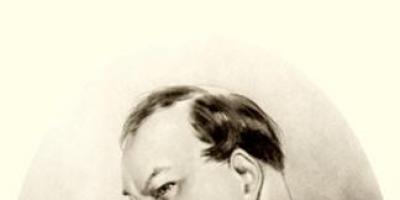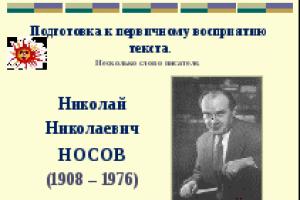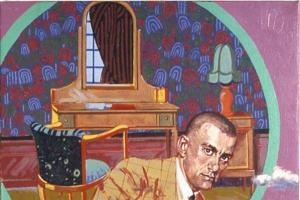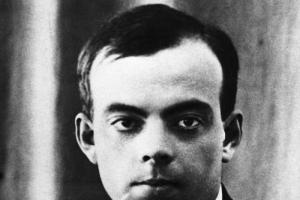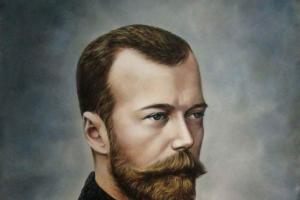A prominent representative of the golden age of Russian poetry, Fyodor Tyutchev skillfully encapsulated his thoughts, desires and feelings in the rhythm of iambic tetrameter, allowing readers to feel the complexity and inconsistency of the reality around them. To this day, the whole world reads the poet’s poems.
Childhood and youth
The future poet was born on November 23, 1803 in the village of Ovstug, Bryansk district, Oryol province. Fedor is the middle child in the family. In addition to him, Ivan Nikolaevich and his wife Ekaterina Lvovna had two more children: the eldest son, Nikolai (1801–1870), and the youngest daughter, Daria (1806–1879).
The writer grew up in a calm, benevolent atmosphere. From his mother he inherited a subtle mental organization, lyricism and a developed imagination. In essence, the entire old noble patriarchal family of the Tyutchevs had a high level of spirituality.
At the age of 4, Nikolai Afanasyevich Khlopov (1770–1826), a peasant who bought himself out of serfdom and voluntarily entered the service of the noble couple, was assigned to Fedor.

A competent, pious man not only gained the respect of his masters, but also became a friend and comrade for the future publicist. Khlopov witnessed the awakening of the literary genius of Tyutchev. This happened in 1809, when Fyodor was barely six years old: while walking in a grove near a rural cemetery, he came across a dead turtle dove. An impressionable boy gave the bird a funeral and composed an epitaph in verse in its honor.
In the winter of 1810, the head of the family fulfilled his wife’s cherished dream by purchasing a spacious mansion in Moscow. The Tyutchevs went there during the winter cold. Seven-year-old Fyodor really liked his cozy, bright room, where no one bothered him from morning to night reading poetry by Dmitriev and Derzhavin.

In 1812, the peaceful routine of the Moscow nobility was disrupted by the Patriotic War. Like many representatives of the intelligentsia, the Tyutchevs immediately left the capital and went to Yaroslavl. The family remained there until the end of hostilities.
Upon returning to Moscow, Ivan Nikolaevich and Ekaterina Lvovna decided to hire a teacher who could not only teach their children the basics of grammar, arithmetic and geography, but also instill in the restless children a love of foreign languages. Under the strict guidance of the poet and translator Semyon Yegorovich Raich, Fedor studied the exact sciences and became acquainted with the masterpieces of world literature, showing a genuine interest in ancient poetry.

In 1817, the future publicist attended lectures by the eminent literary critic Alexei Fedorovich Merzlyakov as a volunteer. The professor noticed his extraordinary talent and on February 22, 1818, at a meeting of the Society of Lovers of Russian Literature, he read out Tyutchev’s ode “For the New Year 1816.” On March 30 of the same year, the fourteen-year-old poet was awarded the title of member of the Society, and a year later his poem “Horace’s Epistle to Maecenas” appeared in print.
In the fall of 1819, the promising young man was enrolled in the Faculty of Literature at Moscow University. There he became friends with young Vladimir Odoevsky, Stepan Shevyrev and Mikhail Pogodin. Tyutchev graduated from the University three years ahead of schedule and graduated from the educational institution with a candidate's degree.

On February 5, 1822, his father brought Fedor to St. Petersburg, and already on February 24, eighteen-year-old Tyutchev was enlisted in the Collegium of Foreign Affairs with the rank of provincial secretary. In the Northern capital, he lived in the house of his relative Count Osterman-Tolstoy, who subsequently procured for him the position of freelance attaché of the Russian diplomatic mission in Bavaria.
Literature
In the capital of Bavaria, Tyutchev not only studied romantic poetry and German philosophy, but also translated works and works into Russian. Fyodor Ivanovich published his own poems in the Russian magazine “Galatea” and the almanac “Northern Lyre”.

In the first decade of his life in Munich (from 1820 to 1830), Tyutchev wrote his most famous poems: “Spring Thunderstorm” (1828), “Silentium!” (1830), “As the ocean envelops the globe...” (1830), “Fountain” (1836), “Winter is not angry for nothing...” (1836), “Not what you think, nature... "(1836), "What are you howling about, night wind?.." (1836).
Fame came to the poet in 1836, when 16 of his works were published in the Sovremennik magazine under the title “Poems sent from Germany.” In 1841, Tyutchev met Vaclav Hanka, a figure in the Czech national revival, who had a great influence on the poet. After this acquaintance, the ideas of Slavophilism were clearly reflected in the journalism and political lyrics of Fyodor Ivanovich.
Since 1848, Fyodor Ivanovich held the position of senior censor. The lack of poetic publications did not prevent him from becoming a prominent figure in the St. Petersburg literary society. Thus, Nekrasov spoke enthusiastically about the work of Fyodor Ivanovich and put him on a par with the best contemporary poets, and Fet used Tyutchev’s works as evidence of the existence of “philosophical poetry.”
In 1854, the writer published his first collection, which included both old poems from the 1820s and 1830s, as well as new creations by the writer. Poetry of the 1850s was dedicated to Tyutchev’s young lover, Elena Deniseva.

In 1864, Fyodor Ivanovich’s muse died. The publicist experienced this loss very painfully. He found salvation in creativity. Poems of the “Denisevsky cycle” (“All day she lay in oblivion ...”, “There is also in my suffering stagnation ...”, “On the eve of the anniversary of August 4, 1865”, “Oh, this South, oh, this Nice! ..”, “There is in the primordial autumn...”) – the pinnacle of the poet’s love lyrics.
After the Crimean War, Alexander Mikhailovich Gorchakov became the new Minister of Foreign Affairs of Russia. A representative of the political elite respected Tyutchev for his insightful mind. Friendship with the chancellor allowed Fyodor Ivanovich to influence Russian foreign policy.
Fyodor Ivanovich's Slavophil views continued to strengthen. True, after the defeat in the Crimean War in the quatrain “Russia cannot be understood with the mind...” (1866), Tyutchev began to call on the people not for political, but for spiritual unification.
Personal life
People who do not know Tyutchev’s biography, having briefly familiarized themselves with his life and work, will consider that the Russian poet was a flighty nature, and will be absolutely right in their conclusion. In the literary salons of that time, legends were made about the amorous adventures of the publicist.
 Amalia Lerchenfeld, first love of Fyodor Tyutchev
Amalia Lerchenfeld, first love of Fyodor Tyutchev The writer's first love was the illegitimate daughter of the Prussian king Frederick William III, Amalia Lerchenfeld. The beauty of the girl was admired by both, and Count Benckendorff. She was 14 years old when she met Tyutchev and became very interested in him. Mutual sympathy turned out to be not enough.
The young man, living on his parents’ money, could not satisfy all the demands of the demanding young lady. Amalia chose material well-being over love and in 1825 she married Baron Krudner. The news of Lerchenfeld's wedding shocked Fyodor so much that the envoy Vorontsov-Dashkov, in order to avoid a duel, sent the would-be gentleman on vacation.

And although Tyutchev submitted to fate, the soul of the lyricist throughout his life languished from an unquenchable thirst for love. For a short period of time, his first wife Eleanor managed to extinguish the fire raging inside the poet.
The family grew, daughters were born one after another: Anna, Daria, Ekaterina. There was a catastrophic lack of money. For all his intelligence and insight, Tyutchev was devoid of rationality and coldness, which is why his career advancement proceeded by leaps and bounds. Fyodor Ivanovich was burdened by family life. He preferred noisy companies of friends and social affairs with ladies from high society to the company of his children and wife.
 Ernestine von Pfeffel, second wife of Fyodor Tyutchev
Ernestine von Pfeffel, second wife of Fyodor Tyutchev In 1833, at a ball, Tyutchev was introduced to the wayward Baroness Ernestine von Pfeffel. The entire literary elite was talking about their romance. During another quarrel, the wife, tormented by jealousy, in a fit of despair, grabbed a dagger and hit herself in the chest area. Fortunately, the wound was not fatal.
Despite the scandal that erupted in the press and general censure from the public, the writer was unable to part with his mistress, and only the death of his legal wife put everything in its place. 10 months after the death of Eleanor, the poet legalized his relationship with Ernestina.

Fate played a cruel joke on the baroness: the woman who destroyed her family shared her legal husband with her young mistress, Elena Alexandrovna Denisyeva, for 14 years.
Death
In the mid-60s and early 70s, Tyutchev rightly began to lose ground: in 1864, the writer’s beloved, Elena Aleksandrovna Denisyeva, died, two years later the creator’s mother, Ekaterina Lvovna, died, in 1870, the writer’s beloved brother Nikolai and his son Dmitry, and three years later the daughter of the publicist Maria went to another world.

The string of deaths had a negative impact on the poet’s health. After the first stroke of paralysis (January 1, 1873), Fyodor Ivanovich almost never got out of bed; after the second, he lived for several weeks in excruciating suffering and died on July 27, 1873. The coffin with the body of the lyricist was transported from Tsarskoe Selo to the cemetery of the Novodevichy Convent in St. Petersburg.
The literary heritage of the legend of the golden age of Russian poetry has been preserved in collections of poems. Among other things, in 2003, based on Vadim Kozhinov’s book “The Prophet in His Fatherland Fyodor Tyutchev,” the series “The Love and Truth of Fyodor Tyutchev” was filmed. The film was directed by the daughter. She is familiar to Russian audiences from her role in the film “Solaris”.
Bibliography
- "Scald's Harp" (1834);
- “Spring Storm” (1828);
- "Day and Night" (1839);
- “How unexpected and bright...” (1865);
- “Reply to the Address” (1865);
- "Italian villa" (1837);
- “I Knew Her Even Then” (1861);
- “Morning in the Mountains” (1830);
- "Fires" (1868);
- “Look how the grove turns green...” (1857);
- "Madness" (1829);
- "Dream at Sea" (1830);
- "Calm" (1829);
- Encyclica (1864);
- "Rome at Night" (1850);
- “The feast is over, the choirs have fallen silent...” (1850).
Fyodor Ivanovich Tyutchev (1803−1873) - Russian poet. Also known as a publicist and diplomat. Author of two collections of poems, winner of a number of the highest state titles and awards. Currently, Tyutchev's works are compulsorily studied in several classes of secondary schools. The main thing in his work is nature, love, Motherland, and philosophical reflections.
In contact with
Brief biography: early life and training
Fyodor Ivanovich was born on November 23, 1803 (December 5, old style) in the Oryol province, in the Ovstug estate. The future poet received his primary education at home, studying Latin and ancient Roman poetry. His childhood years largely predetermined Tyutchev’s life and work.
As a child, Tyutchev loved nature very much; according to his memoirs, he “lived the same life with it.” As was customary at that time, the boy had a private teacher, Semyon Egorovich Raich, a translator, poet and simply a person with a broad education. According to the memoirs of Semyon Yegorovich, it was impossible not to love the boy, the teacher became very attached to him. Young Tyutchev was calm, affectionate, and talented. It was the teacher who instilled in his student a love of poetry, taught him to understand serious literature, and encouraged creative impulses and the desire to write poetry on his own.
Fyodor's father, Ivan Nikolaevich, was a gentle, calm, reasonable person, a real role model. His contemporaries called him a wonderful family man, a good, loving father and husband.
The poet's mother was Ekaterina Lvovna Tolstaya, second cousin of Count F. P. Tolstoy, the famous sculptor. From her, young Fedor inherited dreaminess and a rich imagination. Subsequently, it was with the help of his mother that he met other great writers: L.N. and A.K. Tolstoy.
At the age of 15, Tyutchev entered Moscow University in the department of literature, from which he graduated two years later with the degree of candidate of literary sciences. From that moment on, his service began abroad, at the Russian embassy in Munich. During his service, the poet made personal acquaintance with the German poet, publicist and critic Heinrich Heine, and the philosopher Friedrich Schelling.
In 1826, Tyutchev met Eleanor Peterson, his future wife. One of the interesting facts about Tyutchev: at the time of meeting the poet, the young woman had already been a widow for a year, and she had four young sons. Therefore, Fyodor and Eleanor had to hide their relationship for several years. They subsequently became the parents of three daughters.
Interesting, that Tyutchev did not dedicate poems to his first wife; Only one poem dedicated to her memory is known.
Despite his love for his wife, according to biographers, the poet had other connections. For example, in the winter of 1833, Tyutchev met Baroness Ernestina von Pfeffel (Dernberg in his first marriage), became interested in the young widow, and wrote poetry for her. To avoid scandal, the loving young diplomat had to be sent to Turin.
 The poet's first wife, Eleanor, died in 1838. The steamer on which the family sailed to Turin suffered a disaster, and this seriously undermined the young woman’s health. This was a great loss for the poet; he sincerely grieved. According to contemporaries, after spending the night at his wife’s coffin, the poet turned gray in just a few hours.
The poet's first wife, Eleanor, died in 1838. The steamer on which the family sailed to Turin suffered a disaster, and this seriously undermined the young woman’s health. This was a great loss for the poet; he sincerely grieved. According to contemporaries, after spending the night at his wife’s coffin, the poet turned gray in just a few hours.
However, having endured the required period of mourning, a year later he resumed his relationship with Ernestina Dernberg and subsequently married her. In this marriage, the poet also had children, a daughter and two sons.
In 1835 Fyodor Ivanovich received the rank of chamberlain. In 1839, he stopped diplomatic activities, but remained abroad, where he did a lot of work, creating a positive image of Russia in the West - this was the main task of this period of his life. All his endeavors in this area were supported by Emperor Nicholas I. In fact, he was officially allowed to speak independently in the press about political problems arising between Russia and Europe.
The beginning of a literary journey
 In 1810-1820 The first poems of Fyodor Ivanovich were written. As one would expect, they were still youthful, bore the stamp of archaism, and were very reminiscent of the poetry of a bygone century. In 20−40 years. the poet turned to various forms of both Russian lyrics and European romanticism. His poetry during this period becomes more original and original.
In 1810-1820 The first poems of Fyodor Ivanovich were written. As one would expect, they were still youthful, bore the stamp of archaism, and were very reminiscent of the poetry of a bygone century. In 20−40 years. the poet turned to various forms of both Russian lyrics and European romanticism. His poetry during this period becomes more original and original.
In 1836, a notebook with poems by Fyodor Ivanovich, then unknown to anyone, came to Pushkin.
The poems were signed with only two letters: F. T. Alexander Sergeevich liked them so much that they were published in Sovremennik. But the name Tyutchev became known only in the 50s, after another publication in Sovremennik, which was then headed by Nekrasov.
In 1844, Tyutchev returned to Russia, and in 1848 he was offered the position of senior censor at the Ministry of Foreign Affairs. At that time, Belinsky's circle emerged, in which the poet took an active part. Together with him there are such famous writers, like Turgenev, Goncharov, Nekrasov.
In total, he spent twenty-two years outside Russia. But all these years Russia appeared in his poems. It was “Fatherland and Poetry” that the young diplomat loved most, as he admitted in one of his letters. At this time, however, Tyutchev almost did not publish, and as a poet he was completely unknown in Russia.
Relations with E. A. Deniseva
 While working as a senior censor, while visiting his eldest daughters, Ekaterina and Daria, at the institute, Fyodor Ivanovich met Elena Alexandrovna Denisyeva. Despite the significant difference in age (the girl was the same age as his daughters!), they began a relationship that ended only with the death of Elena, and three children appeared. Elena had to sacrifice many for the sake of this connection: the career of a maid of honor, relationships with friends and father. But she was probably happy with the poet. And he dedicated poems to her - even fifteen years later.
While working as a senior censor, while visiting his eldest daughters, Ekaterina and Daria, at the institute, Fyodor Ivanovich met Elena Alexandrovna Denisyeva. Despite the significant difference in age (the girl was the same age as his daughters!), they began a relationship that ended only with the death of Elena, and three children appeared. Elena had to sacrifice many for the sake of this connection: the career of a maid of honor, relationships with friends and father. But she was probably happy with the poet. And he dedicated poems to her - even fifteen years later.
In 1864, Denisyeva died, and the poet did not even try to hide the pain of his loss in front of his acquaintances and friends. He suffered from pangs of conscience: due to the fact that he put his beloved in an ambiguous position, he did not fulfill his promise to publish a collection of poems dedicated to her. Another grief was the death of two children, Tyutchev and Deniseva.
During this period, Tyutchev was promoted quite quickly:
- in 1857 he was appointed full-time state councilor;
- in 1858 - chairman of the Committee of Foreign Censorship;
- in 1865 - Privy Councilor.
Besides, the poet was awarded several orders.
Collections of poems
In 1854, the first collection of the poet’s poems was published, edited by I. S. Turgenev. The main themes of his work:
- nature;
- Love;
- Homeland;
- meaning of life.
 In many poems one can see a tender, reverent love for the Motherland and worries about its fate. Tyutchev’s political position is also reflected in his work: the poet was a supporter of the ideas of pan-Slavism (in other words, that all Slavic peoples would unite under the rule of Russia), and an opponent of the revolutionary way of solving problems.
In many poems one can see a tender, reverent love for the Motherland and worries about its fate. Tyutchev’s political position is also reflected in his work: the poet was a supporter of the ideas of pan-Slavism (in other words, that all Slavic peoples would unite under the rule of Russia), and an opponent of the revolutionary way of solving problems.
In 1868, the second collection of the poet’s lyrics was published, which, unfortunately, turned out to be no longer so popular.
All the poet’s lyrics - landscape, love, and philosophical - are necessarily imbued with reflections on what the purpose of man is, on questions of existence. It cannot be said that any of his poems are dedicated only to nature and love: all his themes are intertwined. Every poem by a poet- this is, at least briefly, but necessarily a reflection on something, for which he was often called a poet-thinker. I. S. Turgenev noted how skillfully Tyutchev depicts the various emotional experiences of a person.
The poems of recent years are more like a lyrical diary of life: here are confessions, reflections, and confessions.
 In December 1872, Tyutchev fell ill: his vision deteriorated sharply, and the left half of his body was paralyzed. On July 15, 1873, the poet died. He died in Tsarskoe Selo and was buried at the Novodevichy cemetery in St. Petersburg. Over the course of his entire life, the poet wrote about 400 poems.
In December 1872, Tyutchev fell ill: his vision deteriorated sharply, and the left half of his body was paralyzed. On July 15, 1873, the poet died. He died in Tsarskoe Selo and was buried at the Novodevichy cemetery in St. Petersburg. Over the course of his entire life, the poet wrote about 400 poems.
Interesting fact: in 1981, asteroid 9927 was discovered at the Crimean Astrophysical Observatory, which was named after the poet - Tyutchev.
It is not known how the life of our compatriot could have developed if he had devoted himself entirely to literature. After all, even as a diplomat, corresponding member, and privy councilor, he managed to clearly and confidently declare himself as a poet.
Childhood and youth
 The future diplomat was born into a family belonging to an old noble family. This happened on November 23 (December 5), 1803. The boy was born in the family estate of Ovstug, Bryansk district, Oryol province. Little Fedya spent his childhood here.
The future diplomat was born into a family belonging to an old noble family. This happened on November 23 (December 5), 1803. The boy was born in the family estate of Ovstug, Bryansk district, Oryol province. Little Fedya spent his childhood here. An image of Fedya, made on porcelain by an unknown artist, has survived. Here the child is three or four years old.
Father, Ivan Nikolaevich, was a role model: calm, gentle, reasonable. A good family man, a loving husband and father - this was the description given by his contemporaries. In the future, Fyodor’s college friend will write in his diary: “I looked at the Tyutchevs, thought about family happiness. If only everyone lived as simply as they do.”
And here is how ten-year-old Fyodor describes his father in a poem that is considered the very first known to us. The boy called him “Dear daddy!”
And this is what my heart told me:
In the arms of a happy family,
The most tender husband, philanthropic father,
True friend of good and patron of the poor,
May your precious days pass in peace!
Mother - Ekaterina Lvovna Tolstaya, an interesting, pleasant woman with a subtle nature and a sensual soul. Probably, her rich imagination and dreaminess were inherited by her youngest son Fedenka. Ekaterina Lvovna was related to the famous sculptor, Count F.P. Tolstoy. She is his second cousin. Through his mother, Fyodor met Lev Nikolaevich Tolstoy and Alexei Konstantinovich Tolstoy.
As was customary among the nobility, the child received home education. The parents took care of a teacher for their son. It was Semyon Egorovich Raich - a wonderful teacher, poet, journalist, translator. Thanks to his talent, the teacher was able to convey love to the pupil and develop a desire to study literature. It was he who encouraged his student’s first poetic experience and, undoubtedly, had a beneficial influence on the formation of the future poet’s creativity.
As a fifteen-year-old boy, Fyodor attended Moscow University as a volunteer and, even before enrolling, in November 1818 he became a student at the Faculty of History and Philology in the literature department. The young man graduated from the university in 1821 with a candidate's degree in literary sciences.
Life abroad
The diplomat makes new business and personal acquaintances. Now he is personally acquainted with Heinrich Heine, a famous German poet, critic and publicist. With the German philosopher Friedrich Wilhelm Schelling. In his diary, Schelling wrote about Tyutchev: “He is an excellent person, a very educated person with whom you always enjoy talking.”
Here, in Munich, Tyutchev got married for the first time. Portraits of the poet's first wife, Eleanor Peterson, testify to her exquisite attractiveness and ability to present herself. At the time of her acquaintance with Fyodor Tyutchev, the young woman had already been a widow for a year and had four young sons. This is probably why the young people hid their relationship for several years.
This marriage was successful. Three daughters were born there. After eleven years of marriage, Fyodor wrote to his parents: “...I want you, who love me, to know that no one has ever loved another the way she loves me...”
Fyodor did not dedicate poems to his first wife. Only a poem dedicated to her memory is known:
At the hours when it happens
It's so heavy on my chest
And the heart languishes,
And darkness is only ahead;
.........................................
So sweet and gracious
Airy and light
to my soul a hundredfold
Your love was there.
Tyutchev’s biographers tell us that despite his love for his wife, the diplomat also has other connections. However, quite serious. In the winter of 1833, at a social event, Fyodor Ivanovich met Baroness Ernestina von Pfeffel, Dernberg’s first marriage. The poet becomes interested in a young widow, writes poetry to her, and actually creates a fatal love triangle.
Probably, if this passion did not exist, we would not read such poems:
I love your eyes, my friend,
With their fiery-wonderful play,
When you suddenly lift them up
And, like lightning from heaven,
Take a quick look around the whole circle...
But there is a stronger charm:
Eyes downcast
In moments of passionate kissing,
And through lowered eyelashes
A gloomy, dim fire of desire.
To avoid compromising information at the embassy, it was decided to send the loving chamberlain to Turin.
It is unknown how the drama of the love triangle could have played out, but in 1838 Eleanor dies. Fyodor Ivanovich sincerely grieves and experiences her death as a great loss.
A year later, having endured the required mourning, nothing prevents Fyodor Ivanovich from marrying his former mistress Ernestine Dernberg. She was a rich, beautiful, educated woman. The poet developed a deep spiritual connection with her. The couple always treated each other with respect. They had children. First a girl, then two sons.
In total, the diplomat spent 22 years abroad.
Life in Russia
 From 1844 to 1848 Tyutchev served in Russia. At the Ministry of Foreign Affairs he was entrusted with the position of senior censor. There is a lot of work, there is almost no time left for poetry.
From 1844 to 1848 Tyutchev served in Russia. At the Ministry of Foreign Affairs he was entrusted with the position of senior censor. There is a lot of work, there is almost no time left for poetry. No matter how busy the senior censor was, he found time for his family. Among other things, Fyodor Ivanovich visits his daughters, who were just studying at the institute. During one of his visits to Daria and Ekaterina, the amorous Fyodor Ivanovich met Elena Alexandrovna Denisyeva, the same age as his eldest daughters. The relationship began and lasted until Elena’s death. A large number of poems are dedicated to this woman. Three children were born from this relationship.
Elena put everything on the altar of her love: her relationship with her father, with her friends, her career as a maid of honor. She was probably happy with the poet, who was torn between two families and dedicated poems to her.
But if the soul could
Find peace here on earth,
You would be a blessing to me -
You, you, my earthly providence!..
Even fifteen years later, poetry flows about this difficult relationship.
Today, friend, fifteen years have passed
Since that blissfully fateful day,
How she breathed in her whole soul,
How she poured all of herself into me...
At this time, Tyutchev stood at a fairly high level in the hierarchy of officials. Since 1857 - active state councilor, since 1858 - chairman of the Committee of Foreign Censorship, since 1865 - privy councilor.
Tyutchev was awarded state awards: the Imperial Order of St. Anne, the Imperial and Royal Order of St. Stanislav, the Imperial Order of St. Equal-to-the-Apostles Prince Vladimir.
After the death of his mistress in 1864, the poet does not even try to hide his pain of loss to strangers. He is tormented by pangs of conscience. The poet considers himself guilty because he put his beloved in a false position. He reproaches himself even more for the unfulfilled promise; a collection of poems dedicated to Denisyeva has not been published. And the death of two children together with Elena completely brought the poet to insensibility.
Fyodor Ivanovich lived 69 years. I have been sick for the last few years. He died in the arms of his second legal wife, whom he also loved and respected.
Periodization of poetry
Some of the poet's poems are the property of Russian classics!
Biographers divide Tyutchev’s work into three main periods:
➤ 1st period - initial. These are the years 1810-1820 - youthful poems, stylistically close to the 18th century.
➤ 2nd period - original poetics, 1820-1840. Individual traits with traditional European romanticism and a mixture of solemnity.
➤
3rd period - from 1850. Tyutchev did not write poetry for almost ten years. Poems written in the last ten years of his life are similar to the poet’s lyrical diary. They contain confessions, reflections, and confession.
The poem, written in 1870, “I met you - and all the past”, like a farewell chord, reveals the poet’s soul. This is a real pearl of Fyodor Ivanovich’s work. These poems and music by composer and conductor Leonid Dmitrievich Malashkin made the romance “I Met You” one of the most famous and recognizable.
A capable, brilliant and very amorous man, Fyodor Ivanovich lived a decent life, trying to remain honest to the end with himself, his Motherland, his lovers, and his children.
Tyutchev's biography briefly, the most important thing you will learn in this article.
Biography of Tyutchev, the most important things briefly
Fedor Ivanovich Tyutchev was born November 23, 1803 in the village of Ovstug, in the Oryol province. His parents were noble and educated people. He received an excellent education: teacher Semyon Raich taught him at home, who instilled in him a love of poetry. Already at the age of 12, Fyodor was translating the works of Horace and trying to write poems. At the age of 14 he was accepted into the staff of the Society of Lovers of Literature. And in 1816 Tyutchev became a volunteer student at Moscow University. In 1819 he entered the Faculty of Philology, which he graduated in just 2 years.
Having received a doctorate in literature, he got a job at the College of Foreign Affairs. In 1822, Tyutchev went to serve in Munich. He devoted three years to the diplomatic service. At this time I wrote poetry only for myself. He returned to his homeland only in 1825. Returning to Munich, he married Eleanor Peterson, taking custody of her 3 children from his first marriage. The couple also had their own children - 3 beautiful daughters. The city also gave him friendship with the philosopher Schelling and the poet Heine.
In the spring of 1836, Fyodor Ivanovich transferred his lyrical works to St. Petersburg, which were published in Pushkin’s magazine Sovremennik. In general, his German service lasted 15 years. In the spring of 1837, the poet and diplomat received leave and went to St. Petersburg for 3 months.
At the end of his vacation, he was redirected to Turin as first secretary and charge d'affaires of the Russian mission. His wife dies in Italy and a year later he marries Mrs. Ernestine Dernberg again. This was the beginning of the end of his diplomatic career, as he voluntarily went to Switzerland for a wedding.
Fyodor Ivanovich tried for 2 whole years to return to service, but in vain. He was permanently excluded from the list of Ministry officials. After his dismissal, Tyutchev lived for another 4 years in Munich, Germany.
Sings returned to Moscow in 1843. Soon he moved to St. Petersburg. In the spring of 1845, he was hired by the Ministry of Foreign Affairs.
But the poet’s poems and journalistic articles brought him popularity only in 1854, when a separate collection of his poems was published.
Tyutchev, whose poems, biography and creative path will be discussed below, is an extremely interesting person. It is not for nothing that he is considered one of the best Russian classics, among whom he occupies at least a place of honor. He became famous not only as a poet, but also as a diplomat in the service of Russia, and also (albeit to a lesser extent) as a publicist and corresponding member of the St. Petersburg Academy of Sciences. Like many, his relationships with women were confusing, one might say, creative and did not fit into the framework of philistine morality. There were mistakes and tragic moments along the poet’s life path.
F.I. Tyutchev, biography. A Brief History of Young Years
Fyodor Tyutchev saw the light of day on the family estate of Ovstug, Bryansk district, on December 5, 1803. You could say he was a child prodigy. He knew Latin, was fond of it, and at the age of 13 he translated the poems of Horace. At the age of fourteen he became a free student of the Literary Department of Moscow University, and at 16 he became a member of the student Society of Lovers of Russian Literature. Having received his diploma in 1821, Tyutchev received a good position - work as an attaché (albeit freelance) in Bavaria, at the Russian diplomatic mission.
In Munich he does not give details) meets Heine and Schelling, as well as Novalis. The latter subsequently had a very great influence on the poet’s work. In 1826, the young Russian diplomat married Countess Eleanor Peterson. From this marriage three daughters were born. In 1937, the family suffered a shipwreck. Ivan Turgenev, who happened to be a passenger on the same ship, helped Tyutchev save his wife and daughters. But the disaster had a fatal impact on Peterson's health, and she died in 1838.

Three Muses
Although eyewitnesses say that Tyutchev turned gray at his wife’s coffin overnight, the very next year he entered into a new marriage - with the recently widowed Baroness Ernestina Pfeffel-Dernberg. There is evidence that he had a relationship with her during Eleanor’s life. In addition to these two ladies, the poet dedicated many lyrical poems to a certain E. A. Denisyeva. Which of these three women Tyutchev loved most, the biography - a brief history of his life - is silent about this.
Return to Russia
On behalf of the Russian Ministry of Foreign Affairs, until 1844, Tyutchev was actively involved in promoting the active image of Russia in the West. He writes his first journalistic works: “Letter to Mr. Dr. Kolb”, “Note to the Tsar”, “Russia and the Revolution” and others. In Russia, he took the place of senior censor at the Ministry of Foreign Affairs. In 1858 he rose to the rank of full state councilor.

Being a tough censor and an ardent supporter of the Russian empire, Tyutchev (the poet’s short biography is full of such oddities) was nevertheless a member of Belinsky’s circle and published in the Sovremennik magazine. In December 1872, the Privy Councilor felt a sharp deterioration in his health. Headaches began to haunt him, his left hand lost sensitivity, and his vision weakened. On January 1, 1873, he suffered a stroke that half paralyzed the poet. On July 15 of the same year, Tyutchev died, and this happened in Tsarskoye Selo. The classic is buried at the Novodevichy cemetery.
Poet Tyutchev: biography and creativity
Researchers of Tyutchev’s works and stylistics believe that his path as a creator can be divided into three periods. Youth poems (before 1820) are archaic in style. The second period (1820-40s) is odic poetry, in which the features of European romanticism are intertwined. After a 10-year break in writing poetry, the third, mature period begins (1850-70). The “Denisevsky cycle” of love lyrics is being created, and political works are being written.


